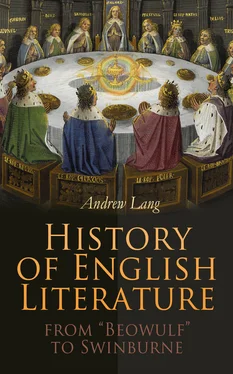Again, the ideas and manners of the Anglo-Saxons were not like our own in many details. Their poets did not write for us, but for men of their own time, whose taste and ways of thinking and living were in many respects very different from ours.
If many people cannot now take pleasure in the novels of Fielding, Scott, Miss Austen, Thackeray, and Dickens—the novels of 1745-1870—because these seem "so old-fashioned," they will certainly be unable to admire the poetry of 500-800. Yet it may be excellent poetry, when we put ourselves as far as we can in the place of the hearers for whom it was composed. If we fail to do this we may read Anglo-Saxon poetry as a matter of history, but, as poetry, we cannot enjoy it.
Minstrels, Story-tellers, and Stories.
Perhaps the oldest of the Anglo-Saxon poems is that called "Widsith," after the name of the far-travelled minstrel or gleeman who sang it before the people in the hall of a prince or noble. This short poem tells us what kind of tales the people liked to hear. It begins:—
Widsith spoke
His word-hoard unlocked,
that is, he opened his treasure of stories as a travelling pedlar opens his box of goods. He says that he has wandered, gathering songs and tales, all over the world from the German Ocean to Egypt and India. He means that he knows all, stories; he is merely giving his hearers their choice of a tale about any king and people in the known world.
Let us suppose that they choose to hear about Ælfwine, or Alboin, king of the Longobards or Lombards, whom Widsith says that he had visited. We know what tales were told of Ælfwine. One of these is a fair example of the rest; it is probably not true. Ælfwine had killed the father of his wife Rosamund, and had a cup made out of the skull, and he made Rosamund drink out of it at a feast. She determined to be revenged for this cruel insult, and took counsel with the king's shield-bearer and guardsman. By his advice she entrapped Beartheow, a very strong man, by a trick, so that he became guilty of high treason. He was now at her mercy, for she threatened to inform against him, and thus compelled him to murder her husband, Ælfwine, in his bed. After that, the king's shield-bearer tried to win the kingdom. But Rosamund gave him poisoned wine, and he, when he knew that it was poisoned, made her drink out the cup, and they two died in the same hour.
This makes a noble tragic song, but the story is only a form of a much older Greek tale which Herodotus, 1000 years earlier, tells of King Candaules of Lydia, of his wife, whom he insulted, and of the Captain of his guard, whom she induced to kill King Candaules.
Probably an Anglo-Saxon minstrel would recite the poem called "Widsith," and then the listeners would ask him for any of the stories which he had mentioned, perhaps for one about Ælfwine; or Alexander the Great; or Sigurd of the Volsungs, who slew the Serpent-Man, Fafnir; or of Hygelac (who is believed to have been the man named, in Latin, Chochilaicus, a real king of about 520); or of Hrothgar, whom Widsith mentions. This king is befriended by Beowulf, in the great Anglo-Saxon poem of that name, the noblest and most famous of all these old songs. The minstrel makes requests for gifts of rings and bracelets; and speaks of his desire to meet generous princes. In the same way Homer loves to tell how golden cups and beautiful swords were given by princes to the minstrels in Greece. The last verses of "Widsith" run thus, in modern English, and are a fair example of early Anglo-Saxon versification:— 2
Swa scrithende So wandering on
gesceapum hweorfath the world about,
glee men gumena gleemen do roam
geond grunda fela; through many lands;
thearfe secgath they say their needs
thonc word sprecath, they speak their thanks,
Simle suth oththe north sure, south or north
sumne gemetath, some one to meet,
gydda gleawne of songs to judge
geofam unhncawne and gifts not grudge.
There are few early Anglo-Saxon poems that can be called "lyrics"; they are rather narratives, as in the case of the songs of war, the battles of Brunanburh and Maldon; or "elegiac," and reflective, as in "The Ruined City," though personal emotion, a characteristic of the lyric, often appears in the Christian poems and elsewhere as we shall see.
"Beowulf" the chief poem may be called a brief "epic," a narrative of over 3000 lines, on great heroic adventures. Such a poem would be sung in hall, to beguile more than one long winter night.
It is impossible to be certain about the date when the original form of this great old poem, "Beowulf," was first composed, because it contains, on the one hand, descriptions of the ancient heathen way of living, thinking, manners, and customs; and, on the other hand, has many allusions to Christian doctrine, which the Anglo-Saxons knew nothing of till after they had quite conquered this country. The poet of "Beowulf" as it now exists, had read the Bible, or knew part of its contents. We must look first at the poem as it stands, and the story as it is told, or rather at the stories, for there are several.
One Beowulf, not our hero, was the son of Scyld. Scyld died, and, in place of Christian burial, was placed in his ship, with arms and treasures, and so sailed out to sea at the wind's will. Not so, when his time came, was our Beowulf buried; that is, Beowulf the hero of the poem, for the earlier Beowulf, son of Scyld, was another man.
The grandson of Scyld was Hrothgar (whose name becomes Roger in later times), and Hrothgar was a Danish king, builder of Heorot, a princely hall. His happiness awoke the envy of Grendel, a fiend of the wilds.
The Christian author of the poem, as it stands, thinks that Grendel and other monsters are descendants of Cain!
The nobles slept in the great hall, whither Grendel came and caught away thirty of them. Men sought other sleeping-rooms, but Grendel still came and slew them. The house was empty, and men promised sacrifices to their false gods all in vain: "they knew not the true God," yet the poet often forgets their ignorance, and makes them speak like Christians:
There was a king of Gothland named Hygelac, a real king living at the beginning of the sixth century. The king's nephew, Beowulf, heard of the evil deeds of Grendel, and set sail with some of Hygelac's men to help the unhappy Hrothgar. They all wore shirts of mail made curiously of interlaced iron rings, they had spears with iron heads, and helmets crowned with the figure of a boar made in iron; some of these shirts of chain-mail and helmets still exist. Coming into the great hall, built of timber plated with gold, the heroes explained their errand, and were well received. As Grendel cannot be harmed with stroke of steel, Beowulf will carry neither sword nor shield, but be slain by Grendel; or slay him with his hands. If Grendel eats him, Hrothgar will not need to give him due burial—burning his body, and burying the bones in a mound of earth; the custom is that of the unconverted German tribes. Hrothgar accepts the offer, the warriors sit at their ale (they had not much wine), and listen to the clear voice of the minstrel as he sings of old adventures. But Hunferth, a thane of Hrothgar, out of jealousy, taunts Beowulf with having been beaten in a swimming match that lasted for seven nights. Beowulf replies that Hunferth "has drunk too much beer": he himself swam better than his opponent for five nights, and slew nine sea-monsters with his sword; Hunferth, on they other hand, dare not face Grendel, and has been the destroyer of his own brothers. Yet Hunferth does not draw his sword, after these insults, which is strange; and the feast in hall goes on merrily.
Such scenes of boasting and quarrelling were, no doubt, common over the ale cups, but Waltheow, Queen of Hrothgar, "the golden-garlanded lady, the peace-weaver," enters the throng, and bears the cup of welcome to Beowulf, thanking God that she has found a helper to her heart's desire. Then she takes her place by her lord Hrothgar.
Читать дальше












